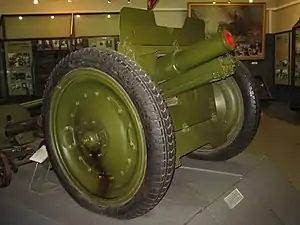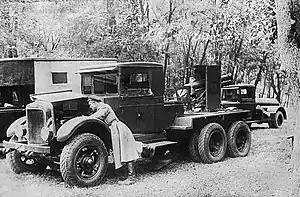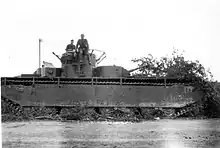76 mm regimental gun M1927
The 76 mm regimental gun M1927 (Russian: 76-мм полковая пушка обр. 1927 г.) was a Soviet infantry support gun. The gun was developed in 1927 by the design bureau of Orudiyno-Arsenalny Trest (OAT) and entered production in 1928. A total of 18,116 pieces were built. On June 22, 1941, the Red Army had 4,708 of these guns. In 1943 the gun was replaced in production by the 76 mm regimental gun M1943, but remained in service until the end of the war. The Germans placed captured guns into service as the 7.62 cm Infanteriekanonehaubitze 290(r) (infantry gun-howitzer), while in the Finnish army they were known as 76 RK/27.
| 76 mm regimental gun M1927 | |
|---|---|
 76-mm regimental gun model 1927 in the Central Armed Forces Museum, Moscow, Russia | |
| Type | Infantry support gun |
| Place of origin | Soviet Union |
| Service history | |
| Used by | |
| Wars | Winter War World War II |
| Production history | |
| Produced | 1928–1943 |
| No. built | 18,116[1] |
| Specifications | |
| Mass | 780 kg (1,720 lb) |
| Length | 3.5 m (11 ft 6 in) |
| Barrel length | 1.25 m (4 ft 1 in) L/16.4 |
| Width | 1.7 m (5 ft 7 in) |
| Height | 1.3 m (4 ft 3 in)[2] |
| Shell | Fixed QF 76.2 x 385mm R |
| Shell weight | 6.2 kg (13 lb 11 oz) |
| Caliber | 76.2 mm (3 in) |
| Breech | interrupted screw |
| Carriage | Pole trail |
| Elevation | -6° to 25° |
| Traverse | 6°[2] |
| Rate of fire | 10 - 12 rpm |
| Muzzle velocity | 387 m/s (1,270 ft/s) |
| Maximum firing range | 4.2 km (2.6 mi)[2] |
The gun was intended for destruction of light field fortifications and openly placed personnel by direct fire. HEAT shell gave it limited anti-tank capabilities. It was chambered for the same shell size as 76.2mm divisional guns, but with a reduced propellant charge. Since firing higher-power divisional gun ammunition could damage the gun, the shell flange was modified so that divisional gun ammunition couldn't be loaded into the chamber of the regimental gun.[3]
The M1927 was issued to rifle and cavalry regiments of the Red Army. Artillery battalion of rifle brigade included one battery of M1927. Some guns were used by anti-tank artillery battalions.
Ammunition
76 mm regimental gun M1943
The M1943 used a modernized barrel from the 76 mm regimental gun M1927 and the split-trail carriage from the 45 mm anti-tank gun M1942 (M-42).
Self-Propelled Guns
Tank Guns
A variant of the M1927 with recoil length reduced from 90 cm (2 ft 11 in) to 50 cm (1 ft 8 in) was designated the 76 mm KT tank gun model 1927/32.[4]
The 76 mm KT was installed in these Soviet tanks:
Gallery
 A M1943 at the Polish Army Museum in Warsaw.
A M1943 at the Polish Army Museum in Warsaw. A SU-12 after maneuvers. Kiev Military District, 45th Mechanized Corps. Autumn 1933.
A SU-12 after maneuvers. Kiev Military District, 45th Mechanized Corps. Autumn 1933. A SU-26 in the Museum of Russian Military History.
A SU-26 in the Museum of Russian Military History..jpg.webp) A BT-7A which is currently at Patriot Park near Moscow.
A BT-7A which is currently at Patriot Park near Moscow. An early T-26 tank with A-43 turret.
An early T-26 tank with A-43 turret. T-28 tanks in a military parade in Orel in the late 1930s.
T-28 tanks in a military parade in Orel in the late 1930s. A captured T-35.
A captured T-35.
References
- Shirokorad, Alexander (2000). Энциклопедия отечественной артиллерии [Encyclopedia of Russian Artillery] (in Russian). Minsk: Kharvest. p. 1156. ISBN 985-433-703-0.
- Chamberlain, Peter (1975). Infantry, mountain, and airborne guns. Gander, Terry. New York: Arco. p. 61. ISBN 0668038195. OCLC 2067391.
- "76-мм полковая пушка обр. 1927 г". Retrieved 2021-04-02.
- Kolomiets, Maksim (2007). T-26 : ti︠a︡zhelai︠a︡ sudʹba legkogo tanka. Moskva: IAuza. pp. 22–24. ISBN 978-5-699-21871-4. OCLC 163620596.
External links
- Chamberlain, Peter & Gander, Terry. Infantry, Mountain and Airborne Guns. New York: Arco, 1975
- Gander, Terry and Chamberlain, Peter. Weapons of the Third Reich: An Encyclopedic Survey of All Small Arms, Artillery and Special Weapons of the German Land Forces 1939-1945. New York: Doubleday, 1979 ISBN 0-385-15090-3
- Ivanov A. - Artillery of the USSR in Second World War - SPb Neva, 2003 (Иванов А. Артиллерия СССР во Второй Мировой войне. — СПб., Издательский дом Нева, 2003., ISBN 5-7654-2731-6)
- Shunkov V. N. - The Weapons of the Red Army, Mn. Harvest, 1999 (Шунков В. Н. - Оружие Красной Армии. — Мн.: Харвест, 1999.) ISBN 985-433-469-4
- 76.2-mm Regimental gun model 1927 on the BattleField.Ru Archived 2007-09-29 at the Wayback Machine
